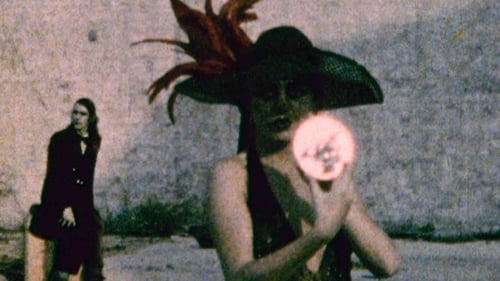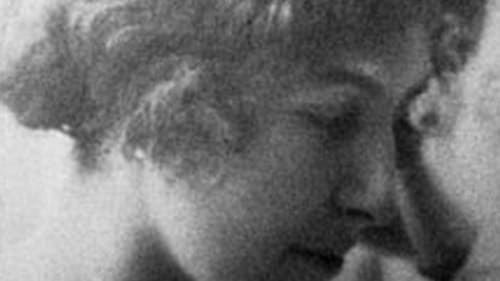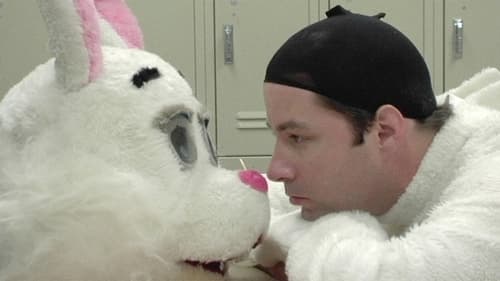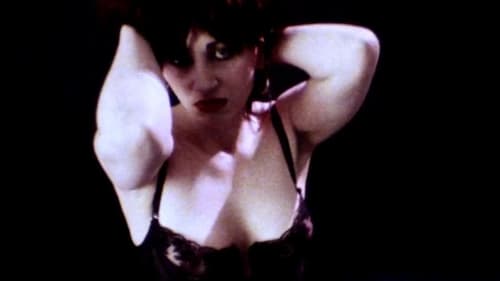House of Cards (1947)
Genre : Crime, Fantasy
Runtime : 16M
Director : Joseph Vogel
Synopsis
In this film without sound, a man awakes disheveled in a rooming house. He stares out the window seeing children playing and a well-dressed man sitting on a chair in the middle of the street reading a newspaper and looking up at him. A headline describes the murder of a child. The disheveled man, whose face expresses fear and despair, leaves, going through the city, alarmed when anyone looks at him. A woman invites him to look through a public telescope. He does then keeps going. He climbs a hill. Two fencers appear; so does a jester. Is flight fruitless?

A woman's vagina is sewn shut.

This film is dominated by an icy blue. In a monumental building a group of scientists submit women to obscure experiments, in which sexuality and cruelty constantly merge into one another. When the film was released, this horrifying game of power and powerlessness was condemned severely by a militant group of feminists. The criticism was undeserved. After all, 'Pentimento' is an art-historical term for a hidden image underneath the actual image giving an indication of how the latter evolved to its current state. The film does not endorse the lopsided power relations in our world but actually challenges them.

An experiment in associative spontaneity.

This film was shot on Super-8 by Derek Jarman in 1977 and is considered to be the inspiration for Jubilee. Jarman often showed his films silent or with different musical accompaniment - one of Jarman's suggestions was Brahms' "Violin Concerto."

Cute and perky college student Alice is invited to a "pool party" by Freida, a female teacher who is actually a lesbian and has designs on Alice. At the party Alice gets drunk, takes acid and immediately becomes a lesbian, taking a bath with Freida. Later Alice gets mixed up with LSD-addicted hippies, rape, more lesbians, more LSD, orgies, suicide, and having sex with guys in boxers.

The Art of Mirrors is an abstract film made in 1973 by director, Derek Jarman. The film, shot in super 8 features figures moving in the foreground and background of an empty space holding mirrors which occasionally flash in the lens of the camera. The images portrayed in the film are reminiscent of Jarman's Abstract Landscape paintings of the same period. In his diary Jarman wrote of this film, 'this is only something that could only be done on a Super 8 camera, with it's built in meters and effects.' The film's title was reworked in the script for 'Dr Dee The Art Of Mirrors and The Summoning Of Angels' in 1975.

Stolen Apples for Karen Blixen is a three-minute black and white film which begins with a portrait of Karen Blixen taken from a photograph.

Artificial Light repeats variations on a single filmic utterance twenty times. The same phrase is a series of portrait shots of a group of young New York artists talking, drinking wine, laughing, smoking, informally. The individual portrait-shots follow each other with almost academic smoothness in lap-dissolves ending in two shots of the entire group followed by a dolly shot into a picture of the moon... There is a chasm between the phrase and its formal inflections. That chasm is intellectual as well as formal. Frampton loves an outrageous hypothesis; his films, all of them, take the shape of logical formulae. -- P. Adams Sitney, Film Culture Reader

Eclipse of the Sun Virgin is a 16mm, film; directed by George Kuchar. The film is based on dealing with a poignant self-identity and the feeling of void between pornography.

Against the background of a grisly mystery, four people face a growing sense of panic and uncleanliness. Part documentary, part "cartoon," part B movie, the film asks questions to which there don't seem to be any clear-cut answers.

A junkie wakes up on the streets and walks around, seeing a woman dressed in all white and a heroin addict shooting up.

An English girl and an Indian elephant, born on the same day, share a common destiny...

Two girls are in a sparsely furnished apartment, scantily clad, and being generally unpleasant to each other.

A doctor and nurse sneak away for a kinky encounter, only to be interrupted by a cop... with a secret of his own.

While working at a photo lab, Frampton found that the waste at both ends of the rolls of processed film—where chemicals worked on the emulsion through clips used to attach the film to the machine—produced images far too interesting to be discarded. For Palindrome, Frampton selected images which he described as “tending towards the biomorphic,” resembling abstract surrealist painting. However, the rigid palindromic structure that Frampton imposes on the images—a motorized sequence based on “twelve variations on each of forty congruent phrases”—deviates from the subjective aesthetic of the expressive, demonstrating Frampton’s interest in the “generative power” of films composed by rules and principles.

Following a year in the life of James Sanchez, it's a story about a guy rapidly approaching thirty, who doesn't have a six-pack, full head of hair or a boyfriend. While his best friend Roxy, an actress-turned-activist, struggles with showing him there's life beyond the glitz of the disco ball, his other friend, Brandon, one of those gay boys comfortable in his own gay skin, works on getting James to at least talk to a boy. Feeling out of place in the world of circuit boys, caught between his Hispanic-American heritage and being gay, we watch James find his place in the world, realizing that life is in the journey, not the destination.

An anatomy of violence. Four young men and two young women are on a drive. There's a rivalry between two guys for one of the girls. On a remote road, the car stalls. The driver hitchhikes for help. Led by the intrepid girl, the others walk toward abandoned buildings, perhaps a mining operation. One of the three guys sits and reads. The intrepid one explores the building and sees something that scares her. She screams; the two rivals and the second girl run to find her. Something she says starts a fight between her two suitors. The one reading a book walks away in disgust. After stopping the fight, the two young women follow. How can this end?

Oddballs dancing, leering at camera, guy shaving a nontraditional part of his body and man ripping his own throat out, woman stabbing herself to death.

Four prisoners, in convicts' stripes, march backwards down stairs and, under the watchful eyes of guards, hop backwards into their cells. Later, one overpowers a guard and springs his three pals. But, will they be able to pull off an escape? Other guards come to the aid of their fallen comrade before all four felons can flee. Guards and convicts spring forward and backward out of cells, up and down stairs, and into and out of freedom.

A soundless film starts in a studio: an artist sits, a nude stands; a page burns, paper cutouts appear, images are distorted. The artist removes his eye; it falls from his hand, seeing images spin as it rolls. A man falls, objects in the studio falls on him, he's not the artist. A woman gets help from a man in a lab coat; he and the man on the floor fight over a shotgun. Outside, in the city, people and cars move backwards. On the street, those from the studio chase a woman who's stolen leeks. In the backward cityscape, they move forward. They run toward a seaside amusement park. The artist follows, his head in a bird cage. He ends up with the woman who went for help; or does he?








